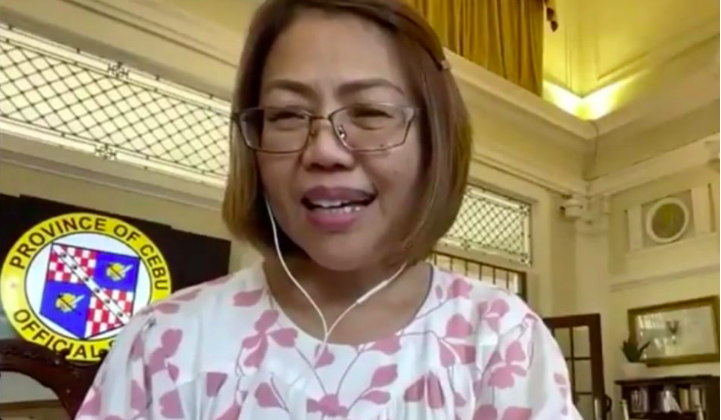Experts on Cebu’s methods: It’s not so much in swab, but in quarantine protocols, variants of concern

Dr. Mary Jean Loreche, DOH-7 chief pathologist, says Cebu has sufficient infrastructure, systems in place to respond to possible surge of infection during the House hearing on June 17. |CDN Digital screen grab from House hearing
CEBU CITY, Philippines — Medical experts from the national government’s anti-COVID task force are ‘deeply concerned’ on Cebu’s quarantine methods, and variants of concern appearing in the country — not so much on the testing and swabbing policies.
But local officials here reiterated that the island-province has sufficient infrastructure and systems in place to respond to any possible surge of the infection.
The House of Representatives’ Committee on Overseas Workers Affairs on Thursday, June 17, conducted a hearing to discuss the plight of Overseas Filipino Workers (OFWs) amid the pandemic.
They invited Cebu Gov. Gwendolyn Garcia and Dr. Mary Jean Loreche, chief pathologist of the Department of Health in Central Visayas (DOH-7), as resource speakers for the virtual meeting.
Part of the hearing’s agenda was the deliberation on the different swab and quarantine policies for incoming OFWs and Returning Overseas Filipinos (ROFs) implemented by the provincial government and the Inter-Agency Task Force for the Management of Emerging Infectious Diseases (IATF-MEID or IATF).
Also present in the hearing was Dr. Alethea De Guzman, director of DOH’s Epidemiology Bureau, who represented Health Secretary Francisco Duque III.
De Guzman, during the first half of the discussion, told members of the lower chamber of Congress that medical experts from the IATF were concerned on how Cebu was carrying out quarantine methods for arriving Filipino passengers from abroad.
“First, I would like to acknowledge the best practices of Cebu City and these best practices have really translated to the decline of cases,” said De Guzman.
“I think, on the part of our experts, we would like our experts to put across the argument (that it) is not really about when we are testing… Our experts are stating the need for strict quarantine,” she added.
The DOH Undersecretary has also pointed out that the anti-COVID task force do not want other provinces in the country to experience what Metro Manila suffered last March when it was reverted to the strictest form of community quarantine due to appearing ‘variants of concerns that could be brought by incoming OFWs and ROFs’.
“Tama si Dra. Loreche, meron po tayong pwede ma-detect upon arrival,” De Guzman said.
(Dr. Loreche is right, it’s possible that we can still detect upon arrival.)
Sought for her comments, Loreche, in a post-hearing interview with reporters on Thursday, said Cebu is ‘well-prepared to respond the concerns raised by IATF’s experts’.
“We have to understand that it’s not really about quarantine anymore. It’s about the policy. Yes, that’s correct (IATF’s concerns). The swabbing and testing is not the issue anymore but the quarantine and I would say we have to add the community response to it,” said Loreche.
She added that there should be a ‘paradigm shift on how the public should address the ongoing COVID-19 pandemic’.
“We understand all of that. There will always be variants of concern. We also understand (that) it will only take one of these OFWs to carry it and transmit it to a larger population. But again as I say, it is our containment measure, our policy, our emergency response, our community response as a whole, which we do have in Cebu. That is why we are pushing for our protocol,” she said.
Cebu has its own swabbing policies for incoming Returning Overseas Filipinos (ROFs) and Overseas Filipino Workers (OFWs) called the Swab-Upon-Arrival policy.
The rule deviated from those implemented by the IATF that requires incoming Filipino travelers from abroad to undergo quarantine for 14 days in which 10 days will be in an accredited facility and the remaining in home quarantine.
They, too, will only be subjected for swabbing on the seventh day.
In Cebu, ROFs and OFWs will be swabbed upon arrival, and will only need to stay in quarantine for a maximum of three days if they test negative for the infection.
Residents in Cebu will also undergo another round of swab tests once they arrive at their respective localities, which will be shouldered by the Department of Health in Central Visayas (DOH-7).
RELATED STORIES
IATF commits to visit Cebu, study its COVID response
DOH-7: We did not defy IATF protocols
With diversion of flights lifted, Cebu continues to implement Swab-Upon-Arrival policy
Travelers from abroad must follow IATF rules on arriving in Cebu
/dbs
Disclaimer: The comments uploaded on this site do not necessarily represent or reflect the views of management and owner of Cebudailynews. We reserve the right to exclude comments that we deem to be inconsistent with our editorial standards.
